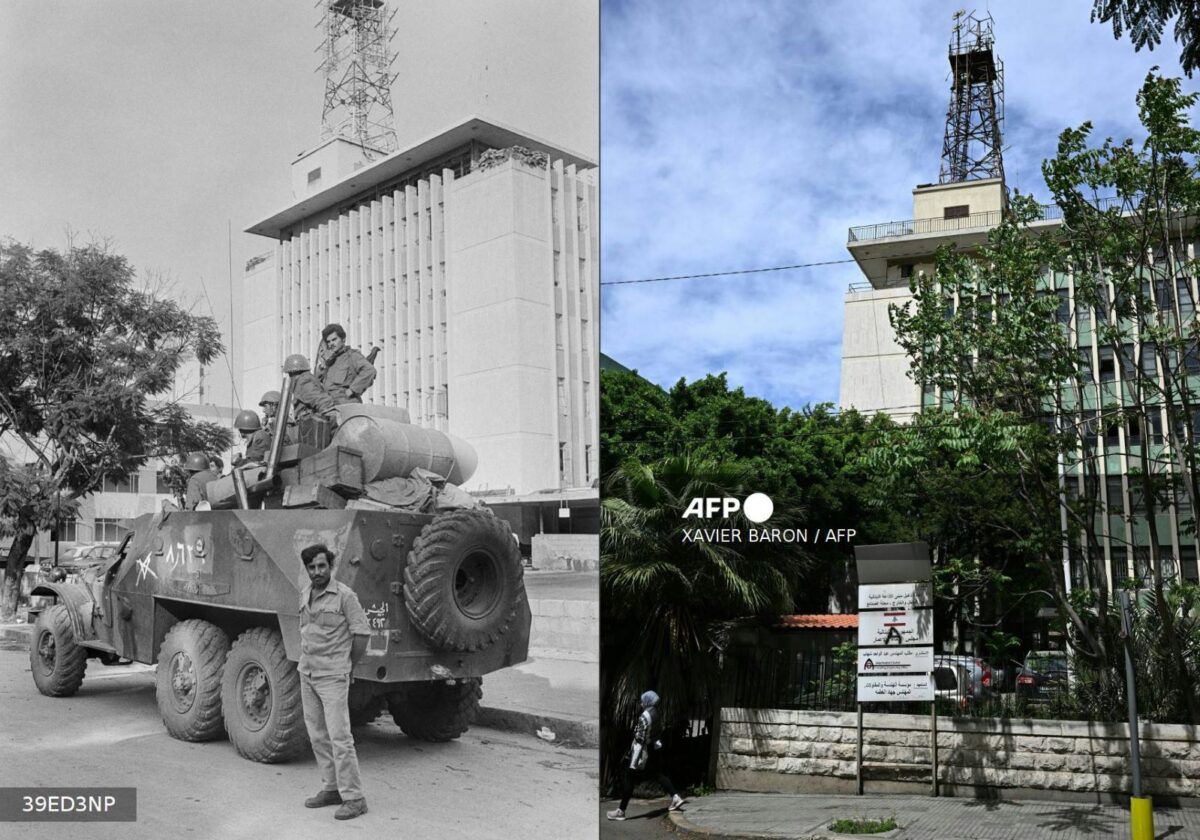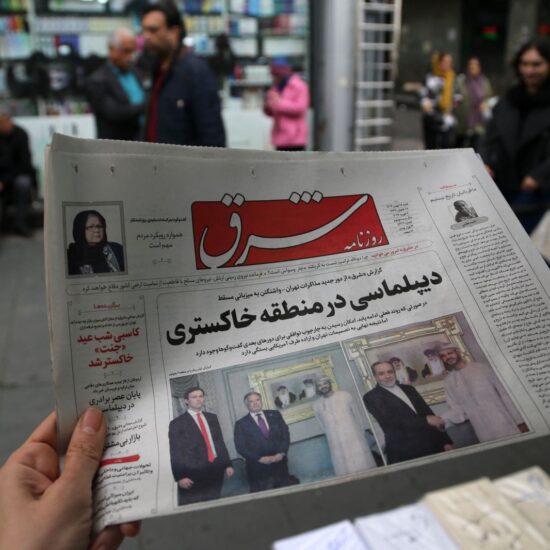
Lebanon recently marked 50 years since the civil war's start with the "50 Years of Amnesia" project, exploring the war’s impact on daily life, while also reflecting on current international tensions and Hezbollah's withdrawal from southern Lebanon as part of a ceasefire agreement with Israel
Lebanon recently commemorated 50 years since the start of its civil war—a painful chapter in the nation’s history that continues to echo through its streets and collective memory. This year’s remembrances took shape through a range of artistic and archival projects, most notably at the American University of Beirut with a series titled “50 Years of Amnesia.” Rather than focusing solely on political narratives or battlefield events, the project explored how the war seeped into daily life—into people’s homes, routines, and sense of self. Through carefully curated photographs, family archives, and old press clippings, the exhibition spotlighted the war’s human toll: breadlines, shattered neighborhoods, makeshift shelters, and the deep psychological scars left behind. The event also featured panel discussions, film screenings, and talks with historians, artists, and survivors, urging a deeper reckoning with the traumas that continue to haunt Lebanese society.
In another commemorative gesture, the infamous bus attack that symbolized the outbreak of the war was brought back into public view, displayed at the Nabu Museum in Heri, North Lebanon—a stark reminder of how a single moment can ignite decades of violence.
These reflections on conflict and memory unfolded against the backdrop of renewed international tensions. As Lebanon revisited its own history of war, the United States and Iran reopened indirect nuclear talks over the weekend in Muscat, Oman. The negotiations—the first since Donald Trump returned to the presidency—were described by U.S. officials as “constructive,” though no concrete progress has been announced.
US Energy Secretary Chris Wright emphasized Washington’s firm stance, declaring, “We’re not going to tolerate a nuclear-armed Iran—not just for the Middle East, but for the world.” While he acknowledged the potential in these early diplomatic efforts, he cautioned that it’s “way too early to tell” if they’ll lead to a new agreement.
Meanwhile, Iran confirmed that the talks would remain indirect, mediated by Oman, and would focus strictly on the nuclear issue and sanctions relief. Foreign Ministry spokesperson Esmail Baghaei stated that future locations for negotiations are still under discussion but clarified that the agenda would not expand beyond the nuclear file.
In Lebanon
Hezbollah sites: A source familiar with Hezbollah’s operations revealed on Saturday that most of the group’s military positions in southern Lebanon have now been handed over to the Lebanese army. The withdrawal is part of a ceasefire agreement reached with Israel in November, following several months of intense clashes that claimed thousands of lives.
According to the source, who spoke to AFP on condition of anonymity, Hezbollah has relinquished control of approximately 190 out of 265 known military sites located south of the Litani River.
The US Aid: Lebanese President Joseph Aoun told Paul Grove, the Republican Staff Director for the US Senate Appropriations Subcommittee on State and Foreign Operations, that Lebanon’s reform efforts are already in motion and are driven by national priorities—not just external pressure.
In response, Grove reiterated the United States’ ongoing commitment to providing aid in support of Lebanon’s recovery and development.
Saudi visit: Saudi envoy Prince Yazid bin Mohammed bin Fahd Al-Farhan, who oversees Lebanese affairs, held a meeting with Lebanese President Joseph Aoun on Monday morning.
Their discussion focused on recent developments both within Lebanon and across the broader region.
Big trade busted: The Lebanese army announced on Saturday that it had intercepted a truck carrying equipment and raw materials used in the production of Captagon in the Hermel region.
The operation, which took place on April 12 in Harf al-Samaqa, was carried out by an army unit in coordination with the Directorate of Intelligence during a routine security patrol.
According to the military, the materials were allegedly being smuggled from Syria into Lebanon.
The confiscated items have been turned over to the judiciary, which has opened an investigation. Authorities say efforts are underway to track down those responsible.
Nawaf Salam in Syria: Lebanese Prime Minister Nawaf Salam arrived in Damascus on his first official visit to Syria since taking office in February. According to his office, Salam will meet with Syrian President Ahmed Alshraaa on Monday to discuss bilateral relations. A Lebanese source told Anadolu that the visit aims to rebuild ties and establish a respectful, stable framework for cooperation between the two countries. Key topics include border security, anti-smuggling efforts, closing illegal crossings, and addressing border clashes. The return of Syrian refugees in Lebanon will also be a central focus of the talks.
In The Region
China tariffs: Chinese officials have urged US President Donald Trump to fully scrap his “reciprocal tariffs” policy, as tensions persist in the ongoing trade war between the world’s two largest economies.
Although Trump recently announced a 90-day suspension on a range of planned global tariffs, he simultaneously raised duties on Chinese imports to 145%. In response, China’s Ministry of Commerce issued a statement calling on Washington to reverse course: “We urge the U.S. to correct its mistakes, abandon the harmful practice of reciprocal tariffs, and return to a path of mutual respect.”
In what appeared to be a partial concession, the Trump administration said Friday that certain electronic goods—including some made in China—would be temporarily exempt from the tariffs. However, U.S. Commerce Secretary Howard Lutnick clarified on Sunday that these exemptions were only short-term.
He noted that the administration intends to implement a separate set of tariffs targeting semiconductors, with details to be announced in the near future. “We need to bring this production back to the U.S.,” Lutnick said.
Hiking tours?: According to local media reports, the Israeli military is organizing hiking tours for civilians in recently seized Syrian territory during the Passover holiday.
The tours, which will run twice daily for a week starting this Sunday, have already sold out. Participants will travel in bulletproof buses under military escort, venturing up to 2.5 kilometers into areas of Syria that had previously been off-limits until the Israel Defense Forces (IDF) captured the Golan buffer zone following the collapse of Bashar al-Assad’s regime in December. Israel has held the Golan Heights since 1967 and now controls even more territory, having expanded its presence by several hundred square kilometers.
The tour includes stops on the Syrian side of Mount Hermon—offering views of Damascus—and at Shebaa Farms, a disputed area at the base of the mountain along the Lebanese border. Long claimed by Lebanon, Shebaa Farms has remained a point of tension and violence between Israel and Hezbollah for years.
Syria and UAE: Syrian President Ahmad al-Sharaa made his first official visit to the United Arab Emirates on Sunday, amid cautious engagement from Emirati leaders who remain wary of Syria’s new leadership following the swift removal of former President Bashar al-Assad by rebel forces four months ago.
The UAE’s state news agency, WAM, reported that President Sheikh Mohammed bin Zayed Al Nahyan received al-Sharaa in Abu Dhabi, expressing hopes for his success in steering Syria toward greater development, stability, and security during this transitional period.
The meeting, according to the statement, included discussions on a range of shared interests, as well as regional and international developments.
More massacres: Israeli airstrikes early Sunday targeted Gaza City’s al-Ahli hospital, destroying key parts of the facility as the Israeli military escalated its offensive and further restricted access to Rafah in southern Gaza.
According to the Palestinian civil defence agency, the strike occurred around 2 a.m., damaging the hospital’s surgical ward and the oxygen generation unit critical for intensive care. Al-Ahli was the only fully operational hospital remaining in Gaza City following repeated attacks on healthcare infrastructure across the north of the strip.
While no casualties were reported from the strike itself, Gaza’s health ministry confirmed the death of a child during a chaotic evacuation, as doctors were unable to provide timely medical assistance.
What We Are Reading
Fifty Years of Amnesia: When the Wounds Return: Journalist Dana Hourany reports on the “50 Years of Amnesia” event at the American University of Beirut, which marks the 50th anniversary of Lebanon’s civil war. The project aims to address the country’s silence around the war’s lasting impact, using personal archives and public history to challenge dominant narratives. Historian Charles Hayek highlights the role of Lebanon’s 1991 amnesty law in fostering historical amnesia, while the initiative focuses on civilian experiences during the war. The goal is to encourage critical engagement with the past and promote healing in Lebanon’s divided society.
The real fight: Political psychologist Ramzi Abu Ismail critiques the recent attacks on reformists in Lebanon, claiming they’re aimed at protecting the country’s entrenched political and financial elite. He argues that Lebanon’s financial collapse remains unaddressed due to a lack of accountability for key figures. Reformist MPs pushing for structural reforms are vilified because their success would threaten the corrupt system. Abu Ismail also points out that Hezbollah, despite positioning itself as an outsider, has been complicit in supporting the very political establishment it criticizes.
Restructuring the financial system: Journalist Maan Barazy reports that Lebanon is gearing up for a high-stakes parliamentary showdown over the future of its banking sector. The debate pits small banks against large ones, each vying for dominance as the country navigates its financial restructuring. The outcome will have major implications for Lebanon’s economic future, with depositors and stakeholders closely watching. The current crisis has exposed tensions between wealthy, internationalized banks and smaller institutions, with the stakes higher than ever for the country’s financial system.
The rise of recycling initiatives in Lebanon: Journalist Rodayna Raydan writes that Lebanon’s waste crisis persists due to poor management and economic instability. While the government has been slow to act, grassroots and private initiatives, such as recycling programs offering rewards and supporting charities, are gaining traction. These efforts are helping shift the culture around waste and offer sustainable solutions amidst the crisis.








